
Pumps that are slow to deliver fuel are a pain for punters but they can also be a pain for retailers, as this may well indicate that the pump is coming to the end of its lifespan.
MADIC UK sales director, Adrian Beeby, explains: “If you notice a decrease in the pump’s efficiency, such as slower fuel delivery or inconsistent metering, it could indicate wear and tear on internal components.”
He says that typically as pumps age, they may require more frequent repairs or maintenance to address issues such as leaks, clogs or mechanical failures. “External signs of corrosion, rust or physical damage to the pump housing or components can indicate deterioration that may compromise its functionality.
“If the pump has been in operation for significantly longer than its expected lifespan, it’s prudent to anticipate potential failures and consider proactive replacement to avoid downtime and safety risks.”
He adds that there can also be a problem with outdated technology: “Advancements in technology and industry standards may render older pumps obsolete or less efficient compared to newer models. If your pump lacks modern features or fails to meet regulatory requirements, it may be time for an upgrade.”
Unfortunately the list of woes continues as ageing pumps may become less energy-efficient over time, resulting in higher energy bills. Beeby says monitoring energy consumption can help identify inefficiencies that may indicate declining performance.
“Regular inspections, maintenance and monitoring of performance metrics can help identify signs of wear and deterioration in a pump, allowing for timely action to address issues and plan for replacement when necessary,” advises Beeby.
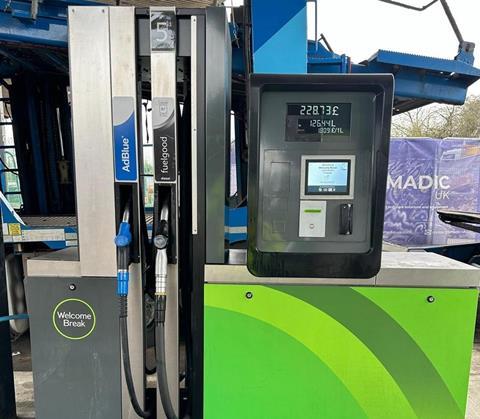
Powerhouse pump
MADIC’s best-selling pump is the Tatsuno Tower, which Beeby describes as a ‘powerhouse’ in the industry.
“One standout feature is its super-light hose retraction, which enhances user convenience and efficiency. Moreover, it delivers fuel at the fastest speed in the industry, maximising throughput and minimising wait times for customers.
“Accuracy is paramount in fuel dispensing and the Tatsuno Tower excels in this aspect with the most precise meter ever produced. This ensures every transaction is measured accurately, promoting trust and customer satisfaction.
“Lastly, our confidence in the Tatsuno Tower’s reliability is reflected in it having one of the industry’s longest warranties, providing peace of mind to our customers.”
But don’t just take Beeby’s word for it. Andy Cotton, operations manager at Top 50 Indie Pearl Forecourts chose Tatsuno pumps from MADIC when he replaced the pumps at three of his 17 sites last autumn.
“It was an easy decision for us. The price point was absolutely fantastic as was the warranty. We got a five-year, no-quibble warranty which is superb.”
It’s not always obvious to punters that a site has new pumps but Andy says they have had comments on theirs and he believes clean and efficient pumps will always bring drivers back to a site. “If someone has the choice between a site on one side of the road with older, dirtier pumps, and one on the other side with clean and shiny pumps, they’ll always pick the cleaner pumps.”
He says at Pearl they are constantly assessing their equipment to ensure it is still fit for purpose. “Pumps are like cars; they really take a hammering. They might have a life expectancy of 15 years but that depends on the fuel volumes they are dispensing so you’re always keeping an eye on them.”
He particularly likes the Tatsuno pumps because they are fast and accurate. “They have hair triggers on the nozzles which I must admit I was a bit sceptical about. But they are easy to use and really, really accurate. They are also really fast. Most pumps deliver 35-40ltrs a minute but the Tatsunos deliver 50-60ltrs a minute which really speeds up filling up and is appreciated by our customers.”
Andy has nothing but good things to say about MADIC and Adrian Beeby. “They are always my first point of call; I wouldn’t go anywhere else!”
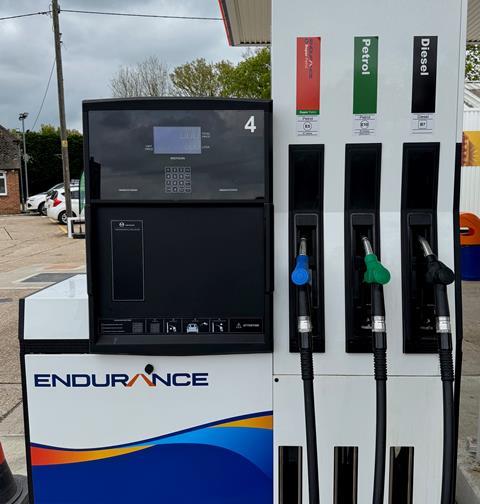
Pricewatch chooses Mepsan
The Pricewatch Group has installed Mepsan Smartline L pumps at two sites so far with a third site coming online soon.
General manager at the Group, Tom Buckley, says: “We work with Eurotank on a number of projects and they were offering the Mepsan pumps as part of their overall service. The competitive price combined with the one-stop-shop and a five-year warranty made it a compelling offer. The five-year warranty was a big factor in the decision making.”
At the Group’s Trinity (Gulf Eastbourne) site they only have two pumps so it wasn’t feasible to stay open during the installation because of the size of the forecourt. Wivelsfield was a new site for Pricewatch and wasn’t open to the public when the installation took place.
Says Tom: “The install was very painless and done in a matter of days. The pumps look great and are very fast at dispensing fuel, in fact they are the fastest we have across the whole estate and this has been commented on by customers.”
Tom says Trinity had refurbished pumps fitted about six years ago but admits that they were already very dated. “We were updating the canopy, shop and brand so having old pumps just didn’t look right, Wivelsfield needed new pumps as the ones there were single hose and 20-plus years old.”
Mepsan pumps are relatively new to the UK market following the Turkish manufacturer’s distribution agreement with Eurotank in 2021. Eurotank’s group sales director Jack Aplin says: “Mepsan pumps are cost effective due to the manufacturing savings available in Turkey as well as being a competitive offering as they are new to the UK market. A large percentage of the components used in the dispensers are manufactured in-house, which minimises the risk of cost increases from supply partners and offers more control for parts availability.”
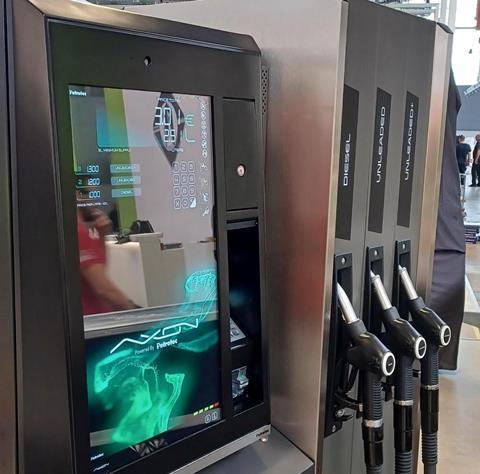
Future-proof your assets
Petrotec Progress 5000 and new Petrotec Axon 5000 pumps are proving popular with customers of Petroassist UK.
Barry Onions, head of sales at the company, says they help future-proof the customer’s investment and allow media and payment options to be retrofitted without having to purchase these options ‘out of the box’.
“Our new Axon model is a great example of this kind of technology with the ability to have a 27” touchscreen to drive promotions and give a fantastic customer experience at the pump.”
He says new pumps should last in the region of 15 to 20 years if maintained correctly and generally it is the lack of replacement spares for older models that is the trigger for customers investing in new equipment.
“As a guide, replacing forecourt pumps with new up-to-date models is likely to cost in the region of £30K to £60K, depending on number of pumps, hoses and the added technology such as Stage 2 VR, Automatic Temperature Compensation, media screens and outdoor payment terminals.
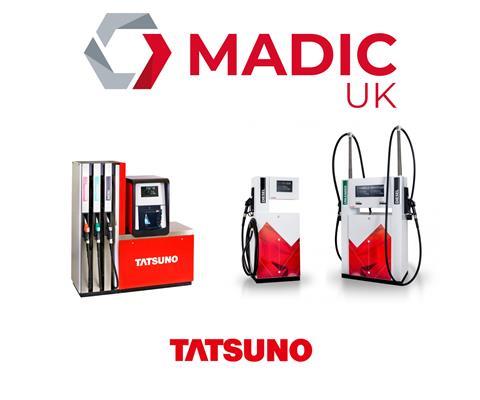
Paid for content:
MADIC UK are exclusive UK suppliers of the world-renowned Tatsuno fuel dispensers, we’re proud to supply forecourts with high quality products from across their range.
For over 100 years, Tatsuno have been at the forefront of dispenser production – always equipped with the latest technology and widely heralded as the world’s finest in performance, quality and longevity.
Advanced Sharp Metering technology and Enhanced Lite Touch hose retraction come as standard, as well as an industry leading warranty.
Quick fuel flow and a hose reach from 4.5m, means vehicles can refuel from either side, helping reduce forecourt queuing and increase volume fuel sales.
With Japanese technology and componentry, Tatsuno dispensers are assembled in Europe for the UK market, with a plethora of customised options available.
Our in-house installation team are highly experienced – carrying out all on-site works necessary to repump. We are also certified to provide full on-going servicing contracts for Tatsuno dispensers in the UK.
With customers ranging from Welcome Break to single-independent sites, we can cater for your needs.
Get in touch T: +44 (0) 330 4339 620 E: contact@madic-uk.com
Top tips for looking after your pumps:
1 Proper installation: Ensure pumps are installed correctly by qualified professionals according to manufacturer guidelines. Proper installation helps prevent issues such as leaks, vibrations and strain on components, which can contribute to premature wear and tear.
2 Regular maintenance: Follow the manufacturer’s recommended maintenance schedule for your pump, including routine inspections, lubrication of moving parts and cleaning of filters and dispensing nozzles. Regular maintenance can help identify and address minor issues before they escalate into larger problems.
3 Monitor performance: Keep track of key performance metrics such as flow rates, meter accuracy and energy consumption. Any significant deviations from normal operation may indicate underlying issues that require attention.
4 Train staff: Provide comprehensive training for staff members responsible for operating and maintaining the pumps. Proper training can help prevent errors and ensure that maintenance tasks are performed correctly.
5 Protect against corrosion: Implement measures to protect pumps from corrosion caused by exposure to harsh environmental conditions or corrosive substances. This may include applying protective coatings, installing corrosion-resistant materials or implementing preventive maintenance measures.
6 Keep records: Maintain detailed records of maintenance activities, repairs and any issues encountered with the pumps. This information can help identify trends, track performance over time and inform decision-making regarding repairs or replacements.
7 Address issues promptly: Address any issues or abnormalities observed during routine inspections or monitoring promptly. Ignoring problems can lead to further damage and increase the likelihood of costly repairs or premature pump failure.
8 Plan for replacement: Develop a proactive replacement plan based on the expected lifespan of the pumps, industry trends and evolving regulatory requirements. Planning ahead allows for seamless transitions and minimises disruptions to fuelling operations.
MADIC’s Beeby says: “By implementing these tips, businesses can optimise the performance and longevity of their pumps, reducing downtime and maintenance costs while ensuring reliable fuelling operations.”
Regular maintenance
Eurotank’s Jack Aplin says looking after your equipment is paramount as you want to extend its life for as long as possible.
“This is where regular maintenance really comes into its own,” he explains. “There sometimes seems to be a reluctance to support ageing equipment and instead just replace it with new equipment, however, we will always do our utmost to keep systems working for as long as possible if that’s what customers want.
“There can be issues getting parts, but we have a large warehouse used for storage, where we are able to test then store often obsolete equipment as well as current models to allow us to pass on low-cost parts and service.”
“Sustainability is important to us, so we try our hardest to keep things working,” adds Aplin. “We did this recently with a customer who was told nothing could be done to fix his old pumps, but our team managed to source some parts and keep the pumps running.”
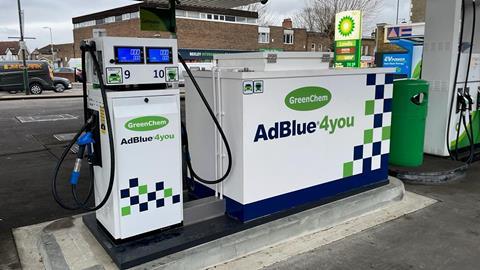
Adding AdBlue
Eurotank Service Group is seeing a growing demand for AdBlue tanks and dispensers so retailers can provide their customers with the convenience of AdBlue at the pump.
Making AdBlue easily accessible at the pump can also help attract new customers, who don’t like the hassle of containers, and offers a fast return on investment, claims Aplin.
“Our customers are reporting an average return-on-investment for an AdBlue tank and pump installation of 12 months – and as quick as four months for one of our customers.
“The solution, which includes a small-footprint AdBlue tank and Mepsan AdBlue dispenser, offers the best returns on sites that have high diesel sales.
“Sites that already have HGV pumps will yield the quickest return as commercial vehicles will have larger AdBlue tanks and be undertaking more mileage.
“Additionally, our customers report only a minimal downturn in the volume of container AdBlue sales.”
Eurotank offers retailers a few different options to make AdBlue more accessible to both domestic diesel car and HGV drivers.
The GreenChem Smart Retail unit with Mepsan AdBlue dispenser combination is designed to fit neatly between pump islands and can be accessed from two lanes within the forecourt. The dispenser has two nozzles – one with a standard hose for cars and vans and a second with a longer hose for trucks. Each hose has its own pump meter so two customers can fill up at the same time.
The tank is two metres long by one metre wide and has a capacity of 1,780 litres. The low height means the shop cashier will still have a clear view of all the pumps on the forecourt.
For forecourts with less space between pump islands, there is a vertical tank option. This tank has the control panel on the front rather than the top like the horizontal tank and has a similar capacity.
Sites with a high volume of HGV fuel sales and a separate HGV lane can opt for a larger capacity tank like GreenChem’s Smart Plus along with a dispenser for both AdBlue and diesel.
The fourth option is for retailers who are looking to repump their whole site. Mepsan dispensers can be supplied with a fourth or fifth nozzle for dispensing AdBlue.
Making business sense
Top 50 Indie Highway Stops opted for both the large capacity tank and dual dispenser for the HGV lane at its Park Royal Service Station in North London, and also put AdBlue on the pump for car and van drivers when it redeveloped the site last year. It has also recently added the small retail units to five other sites and the company’s business development director Tony Head says it’s now a standard part of their forecourt offer and proving to offer the quickest return of all the investments they’ve made in recent years.
“Since installation of AdBlue on the pump, sales have been accelerating and, from a return-on-investment point of view, the speed of payback on this kit makes it one of best investments you’ll make on the forecourt,” he says.
“For the customer it’s hassle free and easy to use – they can just pull up at the pump, fill up with diesel and fill up with AdBlue, rather than having to pick up heavy containers and walk across the forecourt. We get lots of feedback from customers about the convenience of it.”
Beeby at MADIC agrees that demand for AdBlue is accelerating fast. “In previous years it was limited to initially truck stops or large sites with dedicated HGV lanes. However, in the last few years more and more customers are installing our AdBlue dispensing solutions onto their existing car forecourt. The demand for AdBlue in passenger vehicles is so high now that the convenience of an AdBlue dispenser makes absolute sense for any type or size of site really.”
He says MADIC works closely with a leading AdBlue supplier to offer a large range of different dispenser types. “Together we can offer many different shapes of tanks with the dispenser components built in to minimise the footprint that are placed directly onto the forecourt, dispenser and tank skid units that are also placed straight onto the forecourt, through to remote tanks and dispensers. You really don’t need a lot of space to fit one of our solutions.”
And Onions at Petroassist says AdBlue installations for cars and vans are proving extremely popular because of the number of vehicles that require the liquid as well as the margins on the product. “Installing a compact tank and dispenser on an island not only increases convenience for the customer but reduces the amount of plastic waste,” he says, adding that they have developed a compact footprint solution for installation on the island which is a very cost effective solution for customers to install.
Finally, Beeby adds that pay@pump has been gaining popularity steadily over the last few years. “Covid accelerated the popularity initially, but the momentum has continued. Sites with drive-off issues find them very successful; busy convenience sites also see the benefit in reducing queuing for those who just want to ‘gas and go’, leaving the store open and inviting for people to browse without worrying about queues. Also, sites that want to provide a 24-hour fuel service to the community but cannot justify the cost of staff overnight.”
And contrary to popular opinion, Beeby says they have many customers who have found that their shop sales have not reduced after pay@pump was introduced, with some saying that sales have increased.



























